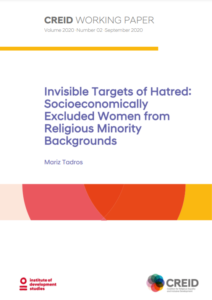 This Working Paper by Mariz Tadros endeavours to make visible the targeting of poor women from religious minorities in contexts where society and/or the state both engage in religious ‘otherisation’, seeking to contribute to addressing the blind spot in both feminist and freedom of religion or belief (FoRB) scholarship on the experiences of the intersection of religious marginality, economic exclusion, and gender inequality.
This Working Paper by Mariz Tadros endeavours to make visible the targeting of poor women from religious minorities in contexts where society and/or the state both engage in religious ‘otherisation’, seeking to contribute to addressing the blind spot in both feminist and freedom of religion or belief (FoRB) scholarship on the experiences of the intersection of religious marginality, economic exclusion, and gender inequality.
The main arguments of this paper are presented in five key propositions which describe and analyse the ways in which the interface between targeting and vulnerability influence the position of women who belong to religious minorities.
The final part of the paper elucidates the interconnections among the multiple threads informing these propositions and what accounts for their prevalence.
Citation
Tadros, M. (2020) Invisible Targets of Hatred: Socioeconomically Excluded Women from Religious Minority Backgrounds, CREID Working Paper 2, Coalition for Religious Equality and Inclusive Development, Brighton: Institute of Development Studies
See also…
Mariz Tadros on ideologically motivated sexual grooming of women from religious minorities (The CREID Podcast)
Invisible targets: time to focus on women and religious minorities (News)
It is time we recognise how ideologically motivated sexual grooming targets women from religious minorities (Briefing Note)


